Business and Social Media in the Middle East: Strategies, Best Practices and Perspectives » książka
topmenu
Business and Social Media in the Middle East: Strategies, Best Practices and Perspectives
ISBN-13: 9783030459628 / Angielski / Miękka / 2021 / 184 str.
Business and Social Media in the Middle East: Strategies, Best Practices and Perspectives
ISBN-13: 9783030459628 / Angielski / Miękka / 2021 / 184 str.
cena 605,23
(netto: 576,41 VAT: 5%)
Najniższa cena z 30 dni: 578,30
(netto: 576,41 VAT: 5%)
Najniższa cena z 30 dni: 578,30
Termin realizacji zamówienia:
ok. 22 dni roboczych
Bez gwarancji dostawy przed świętami
ok. 22 dni roboczych
Bez gwarancji dostawy przed świętami
Darmowa dostawa!
Kategorie:
Kategorie BISAC:
Wydawca:
Palgrave MacMillan
Język:
Angielski
ISBN-13:
9783030459628
Rok wydania:
2021
Wydanie:
2020
Ilość stron:
184
Waga:
0.28 kg
Wymiary:
21.01 x 14.81 x 1.24
Oprawa:
Miękka
Wolumenów:
01
Dodatkowe informacje:
Wydanie ilustrowane











